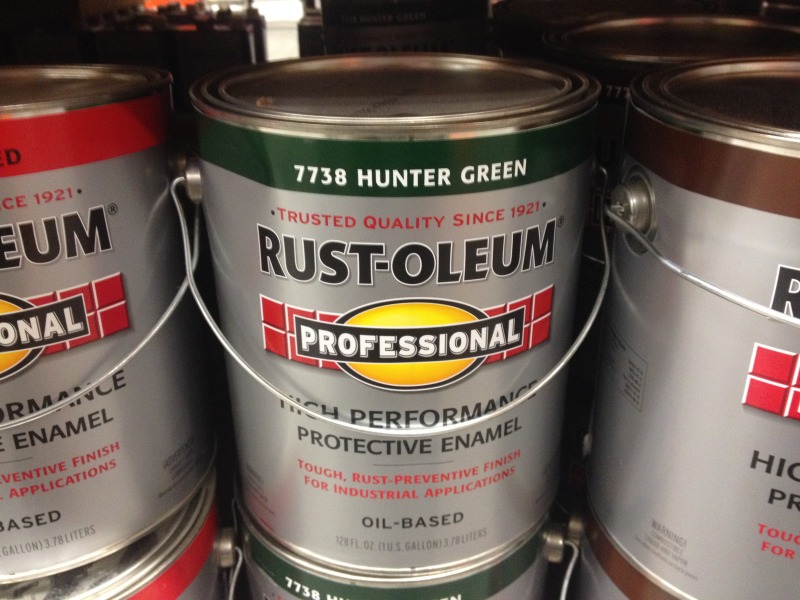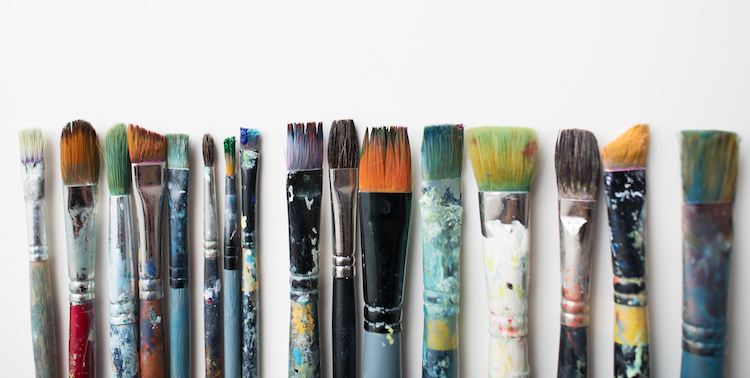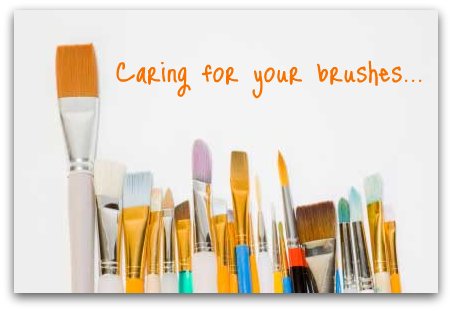Haven't any of you had any professional training at all?

I don't want to steal your thunder Kelly, but this is not Best Practice.
Don't ever put paint thinner into plastic. It will melt most kinds. Why risk a mistake? Old glass salsa jars exist for brush cleaning. label one, put some glass marbles like the flower arranging ones into the bottom to work the brush against. (Plain, not coated with shiny stuff. It'll dissolve) Trying to clean oil based paints out of brushes by just stirring them around doesn't work. If you're desperate a crumpled piece of window screen will work too but it's hard on bristles so this is not a default. Paint thinner is very flammable and an ugly toxin so you want to keep it stingy and the stuff needs to go to Hazardous Waste Disposal. Wipe those brushes really well!
If you're doing fine arts painting go buy a proper brush cleaning pot. A big size one would be good for pro house painters. Solvent sits in it for weeks and it has a sieve to work the bristles over. Paint solids drop below it. The top keeps fumes in and evaporation almost nill over weeks. Minimal exposure, clean brushes. Now wash them! I wash up to thirty brushes a day in the studio; it's just doing the dishes.
For oil paints and stains you can clean your paint brushes with mineral spirits or paint thinner.I like using 2 glass canning jars. The lids seal very well a.
Do NOT use a surfactant/ detergent 'soap'. Use a real soap, a chemically designated soap, with oil or fat in it. You can put it on a cellulose sponge and work the brushes across it to work up a lather, or just work them against your palm. If you use bar soap swipe the brushes across it. The soap cuts the oil, and the fat base conditions the bristles.If you wiped out the paint and rinsed in thinner properly there's very little to wash out. More like a post gym shower then wrestling gunk. You don't want paint in a sink drain or on the back patio. Rinse well. If you do this correctly you'll get to wear brushes out instead of throwing them away. And bristles are chosen for this exposure so they'll get better. It's just like washing your hair. Squeeze out the water and shape them, air dry.
To clean I merely soak in paint thinner a short time shake it out and dry with a paper towel. You can do this over and over if you want. But at around twenty five cent for a brush you could just toss them. And they leave a nice even coat as well. A spark from static electricity could also set it off. So I switched to cleaning with mineral spirits, and was doing just fine with Testors enamels. But, after practicing with some blue paint that I had decanted from a spray can, and cleaning the airbrush with mineral spirits, I shot a bit of lacquer thinner just to check. Depends on the brush. If you're painting with an oil based enamel you use a natural bristle brush and you clean it with mineral spirits or turpentine. Sling out as much solvent as you can and then wrap the brush in a sheet of clean dry newsprint t.
This works for synthetic brushes too. Do not leave soap in the bristles as it will contaminate your paint next time and make a bad paint film. As for exotic paints like epoxy? Yes, use nitrile gloves and a respirator! Outside. But if the stuff is hydrocarbon based a fat soap should work too. Acetone on brushes will kill them fast, so make sure thats a really Best Practice. Again- a soap may work better. Most bristles need the conditioning.
If your brushes start to get that gunky icky feeling, soaking them in that inexpensive liquid oil soap from the grocery store (Also best for regular washing after painting) is like a spa treatment. Leave them in for two or three days. It's magic! Paint in the ferules is a ruined brush, but as regular maintenance this is amazing. I have ten year old mongoose thats still sweet. I also paint a lot.
Do not use soap on watercolor brushes. Just rinse.
Marbles on stream. This is the method professional painters use; It keeps solvent use to an absolute minimum. Reusing a cup or 12 ounces of thinner instead of blowing through gallons of it reduces exposure and that stuff has lead in it. Among other scary things. Don't use it on skin either. Paint'll fall of in 48 hours if soap or olive oil doesn't get rid of it.

Even if you use a thinner only system like the guys who paint cars using industrial paints, a cleaning pot will use less thinner and reduce your chemical exposure. They can be used in series. You can eyeball them at the big online art supply stores, and I shop at industrial supply so don't think they don't interchange. ;-D I'll try to post instructions for the homemade version.
Paint Brush Cleaning Tool
Cleaning Oil Brushes

For anyone that has picked up an oil painting brush and used oil paint the worst thing is cleaning the brushes afterward. You can never seem to get all the crud out of the brush that will harden in the ferrules of the brush. Oh sure you can try to use mineral spirits and then try forever to get the oil out of the brush and then go to the sink and try to get the rest out with soap. I have done all that with the right special art soaps and the mineral spirits and still had oil still hiding in the brush.
The best that I method that I have found to clean your brushes and get all the paint out is the following. After you are done painting for the day or week or whatever.
Can You Clean Latex Paint Brushes With Mineral Spirits
First I saturate the brush with oil usually vegetable oil and then pull out all the paint I can. If there is some paint still left I wash it in vegetable oil again and pull out the remaining oil in a cloth or tissue paper.
Best Way To Clean Paint Brush With Mineral Spirits


Latex Paint Brush Cleaning
Second I wash the brush out with dish soap. After using the oil the soap breaks down the paint and oil very quickly. That is not the case if you still have mineral spirits in the brushes.
Cleaning A Paint Brush With Mineral Spirits
Ableton live 10 suite free download mac. Third After the soap and water wash I pull out as much of the water that I can into a cloth or tissue paper. The I use petroleum jelly and saturate the brush with the jelly and pull out the excess. This allows you to reshape your brush if needed and won’t dry.
This is the best way I have found to clean up oil brushes thoroughly, help them keep their shape and not dry out.
Filthy beasts a memoir. Give it a try and Have fun painting.
